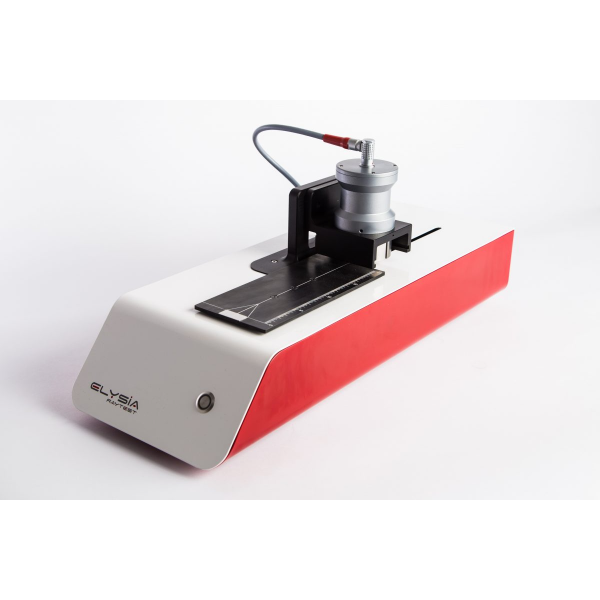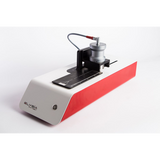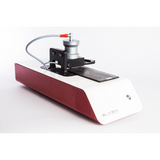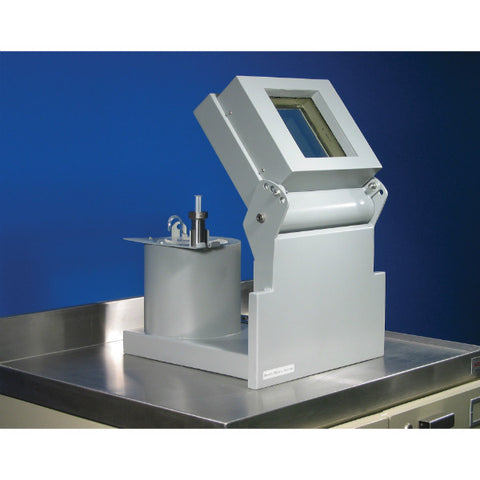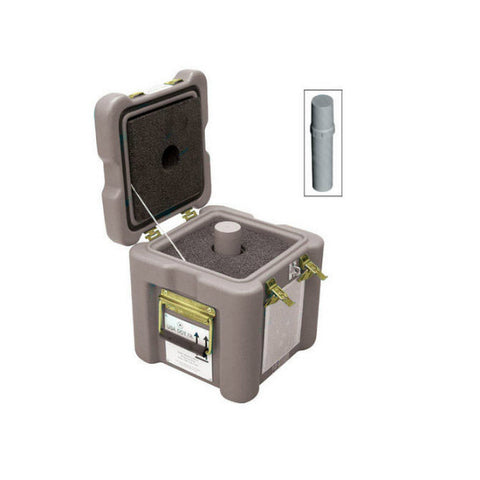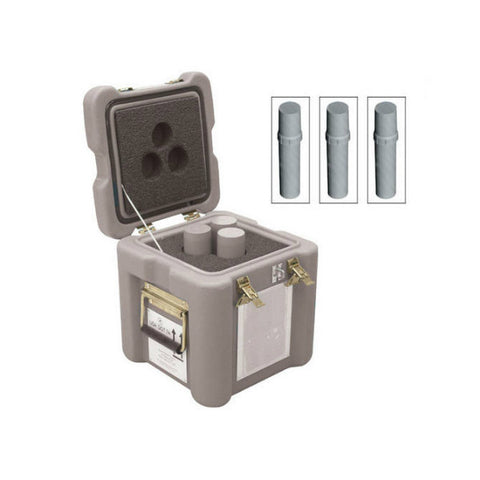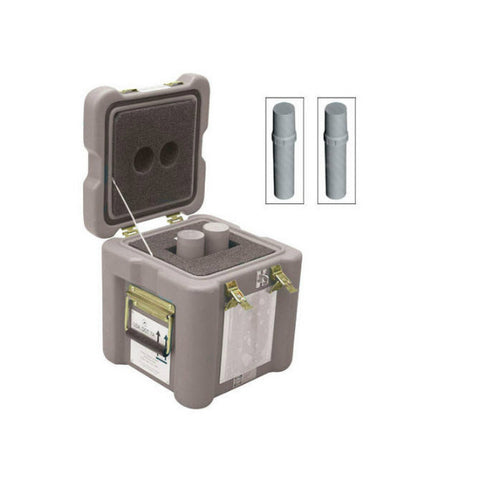The miniGITA Single is the new version of the well know miniGITA Star.
It is a versatile state-of-the-art radio TLC system. The new motor technology reduces considerably the running noise. A complete range of detector probes allow the measurement of nearly every isotope. It is designed for optimal use in nuclear medicine, SPECT or PET laboratories.
Simply exchange the detector and the collimators to get the best performance for every application. Our detectors work gas free, ensuring long life time and low maintenance costs. The high sensitivity combined to the moving sample table allows a very fast analysis, with an average scanning time of less than 1 minute.
GxP features, spectrum scan capabilities and a basic half life time mode make the miniGITA Single a versatile system for your quality control lab. Outstanding detection capabilities, excellent signal-to-noise ratio and optimal signal resolution make the miniGITA Single the perfect workhorse for your lab.
Testing the radiochemical purity with thin layer chromatography and the execution of basic gamma spectrometry are a routine for many nuclear medicine laboratories and SPECT or PET facilities. Having a reliable, easy-to-use system, meeting today’s standards in GMP and documentation rules is mandatory for optimal working conditions. By nature of the measurement scanning resolution, sensitivity, limit of detection, dynamic range and spectrum analysis need antipodal technical solutions.
The complete miniGITA range was designed to be as flexible and adjustable as possible, to ensure the highest performance and the best compromise depending on your actual application. To avoid human errors, system settings and configurations will be detected automatically and stored in the electronic report. The new software allows 3 different measuring modes for chromatography, spectrum analysis and halflife time determination. The miniGITA family has been developed to have the best performance for the TLC with best sensitivity, dynamic range and signal resolution for the chromatography. The half-life time and the spectrum mode enable fast and simple analysis. They are very helpful in daily routine but depending on he application, a dedicated ionization chamber or multi-channel analyzer might be necessary.
Detectors
We have a complete line of new generation probes using different scintillator material and different detection technologies. We propose systems with well-established PMT tubes as well as totally new digital detection technologies, ensuring the best detection for each application.
The miniGITA Single uses also the Elysia Communication protocol (ECP), with a new type of connectors. Simply change the detector/probe and the system will recognize the type and the serial number of your detector.
You can even use the probes with and from our radio-flow monitor GABI Nova.
This automatic probe recognition will give you a perfect documentation of your setup and enhance your GxP tools.
The new cable and communication protocol offers even more versatility because it will allow to exchange probes with all other measuring instruments like the TLC or the multichannel analyzer using the ECP. The new ECP allows also advanced control and diagnostic of your probes to ensure a better performance and a remote diagnostic.
|
Model |
Application |
Resolution |
Dynamic range |
Multichannel |
Collimator |
|
miniGITA OFA probe |
SPECT & PET |
😃😃😃😃 |
😃😃😃 |
😃😃😃 |
Yes |
|
miniGITA PET probe |
PET |
😃😃😃😃😃 |
😃😃😃😃😃 |
|
No |
|
miniGITA New Gen probe |
SPECT & PET |
😃😃😃😃 |
😃😃😃😃😃 |
😃😃 |
Yes |
|
miniGITA MCA probe |
SPECT & PET |
😃 |
😃😃😃 |
😃😃😃😃😃 |
No |
|
miniGITA Alpha probe |
Alpha |
😃😃😃😃 |
😃😃😃 |
----- |
Yes |
Probe types
miniGITA OFA (One fits all) probe:
The One Fits All is based on our V-Shaped BGO technology. The crystal allows you to detect SPECT and PET isotopes. The special V-shaped gives the best resolution without a compromise of sensitivity. A broad range of collimators allows you to adapt the probe to a larger energy band. The detector also has a multichannel function and is suitable for basic spectrum scans.
miniGITA PET probe:
The probe has been designed for use in a PET laboratory. The scintillator and the digital detector technology allow a very high resolution and a high sensitivity to positrons. High insensitivity to gamma radiation and an extremely high dynamic range ensure very low background noise to gamma irradiation and the possibility to handle high amounts of activity. These skills make the detector the right choice for every PET facility.
miniGITA New Gen probe
Like the OFA, the New Gen probe is based on a V-Shaped BGO probe ensuring best resolution with high sensitivity to SPECT and PET isotopes. The probe is using the new electronics with increased dynamic range allowing to use higher activities without signal saturation. A broad range of collimators allows to adapt the probe to a large energy band.
miniGITA MCA probe:
This is a large crystal combined to a PMT. Like all miniGITA probes it is using our ECP and can be used on a GABI Nova for radio flow detection. The large crystal and the high quality PMT are the best choice for spectrum analysis and nucleic identification.
miniGITA Alpha probe
The miniGITA Alpha probe has been designed to provide optimal alpha sensitivity when combined with our TLC scanner. The probe is based on a ZnS (Tl) scintillator connected to an SiPM, combining high efficiency for alpha radiation and low background for beta and gamma. Like all miniGITA probes, it uses ECP and can be used in combination with several other Elysia instruments.
Collimators
To avoid human mistakes and to obtain the best collimation, the miniGita Single has tungsten collimators with an automatic recognition for GMP documentation.
miniGITA Single collimator: 0-60 keV
miniGITA Single collimator: 60-250 keV
miniGITA Single collimator: 250-450 keV
miniGITA Single collimator: > 450 keV
Software
The miniGITA Single is directly controled with GINA software with a digital signal transfer according to GMP/GLP standards. GINA is also used to control the radio-HPLC, the GC or the multichannel analyzer. This allows a faster adaptation and a short learning curve if you decide to use GINA for your QC systems. Background subtraction, a half-life-time correction and dead time correction are only some of the features included.


